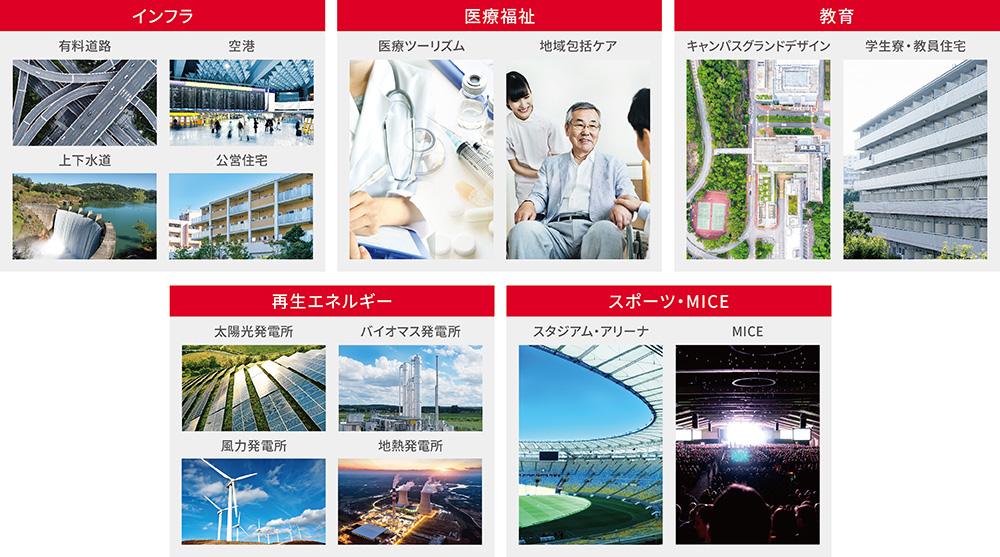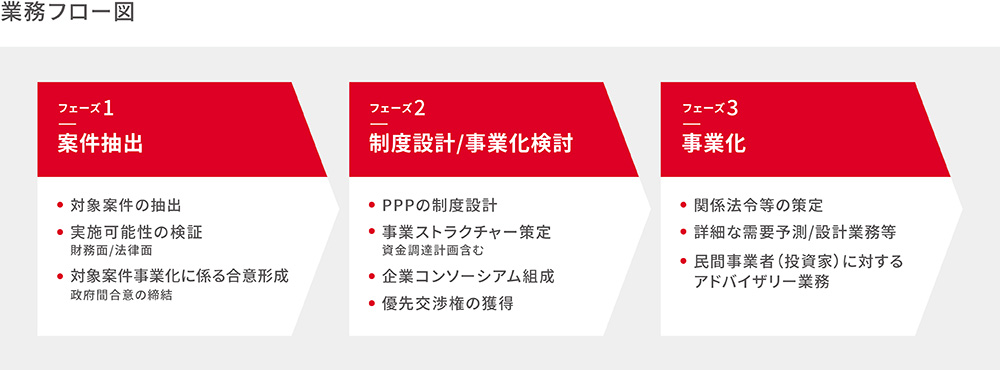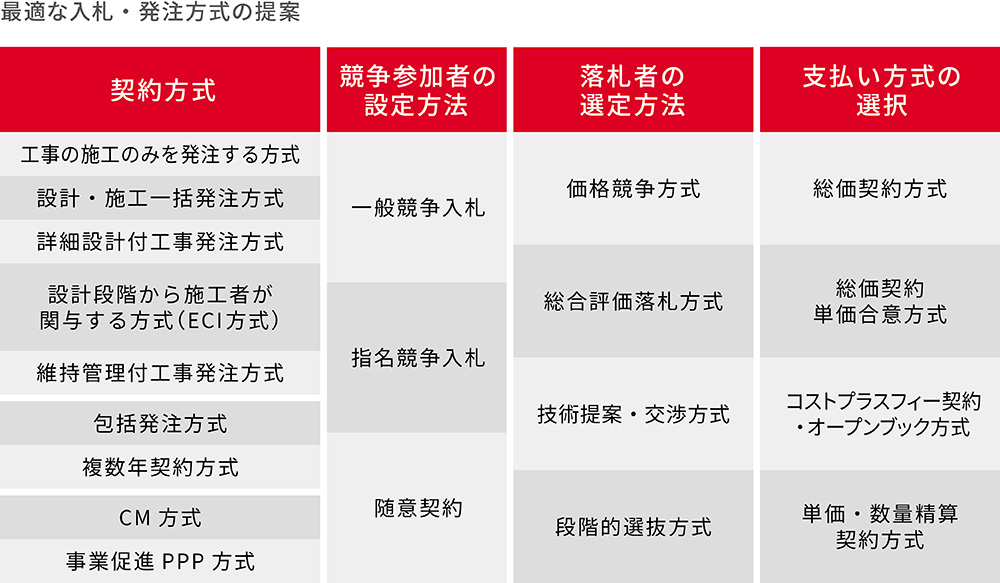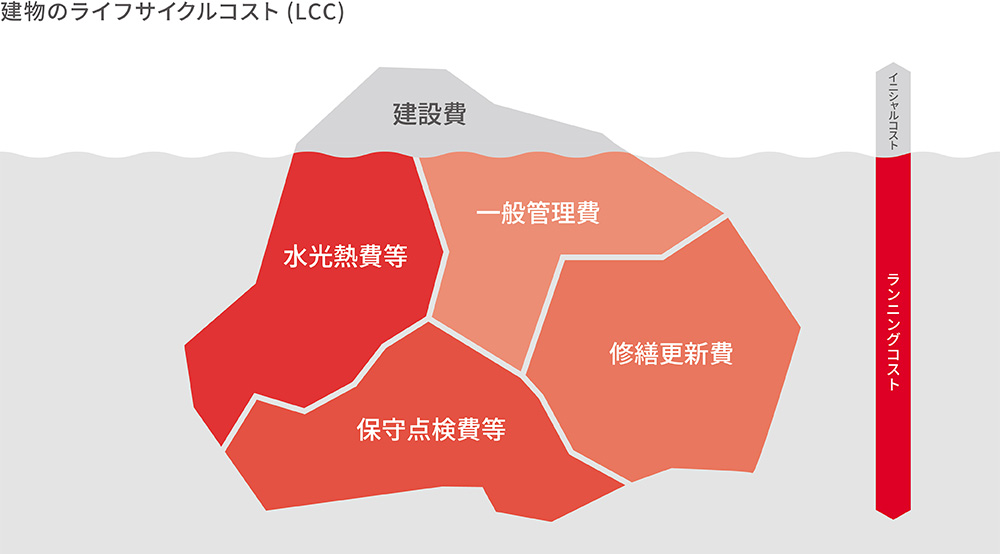SERVICE

Local Governments
-
01
As the "Act on Promotion of Private Finance Initiative" (PFI Act) was enacted in 1999, more and more public-private partnership (PPP) projects are being undertaken to improve the efficiency and quality of services for residents by drawing on the creativity and ingenuity of private companies. As social infrastructures owned by local governments, such as roads, bridges, water supply and sewage systems, are aging, there will be more cases where the PPP method will be considered for their maintenance and management.
There are various methods of PPPs, such as PFI, designated manager systems, public-private management, comprehensive private-sector consignment, and concessions (selling operation rights to a private consortium for a certain period). PFI and PPP projects can be chosen from a variety of options depending on the social situation, the costs and risks that can be borne by the government and the private sector, and the level of interest of private companies.
The creation of PPP schemes requires a great deal of expertise, including financial expertise. From the perspective of local government finances and regional development, where private sector vitality is essential, it is necessary to simultaneously consider the exit strategy of how to manage the operation system after completion in the future construction of public and social infrastructure.
As a project manager, Index Group will promote projects by proposing methods and frameworks to solve issues such as regional development, industrial promotion, comprehensive regional care systems, incubation, and the construction of eco-systems, in addition to social infrastructure.
-
02
Conceptualization and research planning
Local governments formulate concepts in various fields of social infrastructure, such as construction, healthcare, education, tourism, culture, sports, and urban planning, which require in-depth research and analysis because they will become an important part of the future of the region. It goes without saying that it is necessary to solicit opinions from various stakeholders and experts, and ultimately formulate a concept that can be understood by the residents and the council.
Index Group has supported many local governments in their efforts to formulate concepts and build consensus, including the development of business plans that match the history and culture of the local community, and the development of business models in which local companies, organizations, and financial institutions can participate. Through hearings with relevant ministries and agencies, domestic and international private companies, and experts as necessary, we formulate concepts that are feasible and lead to results.
-
03
PPP/PFI system design and commercialization
In Japan, PFI has been introduced as a method of PPP, but in many cases, PFI in Japan is led by the contractor, such as construction companies or maintenance and management companies. In many cases, the incentives to recover the cost, performance, and specifications of the facilities at the operation stage tend to be applied.
In order to bring out the true power of PPPs, Index Group aims for a win-win situation for the local government as the client, the business entity as the recipient, and the residents who receive the services.
Specifically, we provide advisory services and feasibility studies in the phases of project identification, system design and feasibility study, and commercialization, while ensuring appropriate fund-sharing and risk allocation between the public and private parties, fairness in system design, and transparency in procedures.
In the project identification phase, in addition to identifying the target projects, we verify its feasibility from financial and legal perspectives and seek to build consensus for their commercialization. In overseas projects, it is also necessary to conclude an intergovernmental agreement. In the institutional design and feasibility study phase, in addition to the institutional design of what kind of PPP method is appropriate, the project structure, including the financing plan, and the possibility of private sector participation are discussed.
In PPP projects for social infrastructure, it is quite possible that the private sector will not be able to cover all the costs. In such cases, we will present the best option among a wide range of systems, such as a hybrid of governmental financial expenditures and private funds, or the adoption of availability payment in which the government pays a portion of the funds in the form of user fees. Even in cases where there are legal restrictions, we will consider all possibilities without being bound by existing frameworks, such as applying for a special zone for structural reform.
In addition, PPPs require specialized knowledge in law, finance, and infrastructure technology, depending on the project. As a project manager, Index Group forms optimal teams of specialists in each field for projects such as toll roads, airports, water supply and sewage systems, public housing, and state-owned forests, and maximizes the power of each specialist to smoothly promote the institutional design and commercialization of PPPs. -
04
Selection of business partners (RFP, bidding, selection and contract)
The method of selecting business partners varies depending on the project scheme and the requirements of each local government. Based on our extensive experience in selecting business partners for private sector construction projects, we examine the scheme, prepare materials for tenders, conduct bidding, and coordinate with the selected business partners.
It is also important to select the most appropriate procuring method because construction costs vary greatly depending on this.
For example, in the design-build method, the design and construction are procured from a construction company at once, which is expected to make the most of the cost reduction know-how of the company. In addition, we propose the best procuring method that realizes the three-way benefits of the project from the perspectives of fairness, transparency, and appropriate financial expenditure, such as at-risk CM in which the construction manager, as the procurer, agrees on the target cost and then discloses the cost.
-
05
Monitoring of construction and operation
Quality control during construction is based on self-management by the construction company and is ensured by the management services provided by the construction supervisor. Index Group regularly monitors the proper functioning of these management processes as a third party. In particular, it is extremely important to accurately determine at the initial stage of construction whether such a management system has been properly established.
However, it is not easy for local governments to confirm whether construction work is being carried out properly and whether an appropriate management system has been established. In addition to checking the progress of construction and controlling the quality, we regularly check the process itself to ensure that the original management process has not become hollow.
Similarly, to prevent construction projects from deviating from the original budget, we regularly monitor costs and quality assurance of performance and specifications at each phase of the project, from planning, basic design, implementation design, and construction. We also provide effective cost management services based on past data and experience, including negotiations with contractors to increase or decrease construction costs by incorporating value engineering (VE), separate procurement, and cost reduction.
It is also important to reduce lifecycle costs, which are said to be three to five times higher than construction costs, by starting from the design stage, such as reducing maintenance costs and providing consulting services for overall facility management. We also provide solutions to optimize costs throughout the lifecycle of facilities and social infrastructure by utilizing the latest AI/IoT.